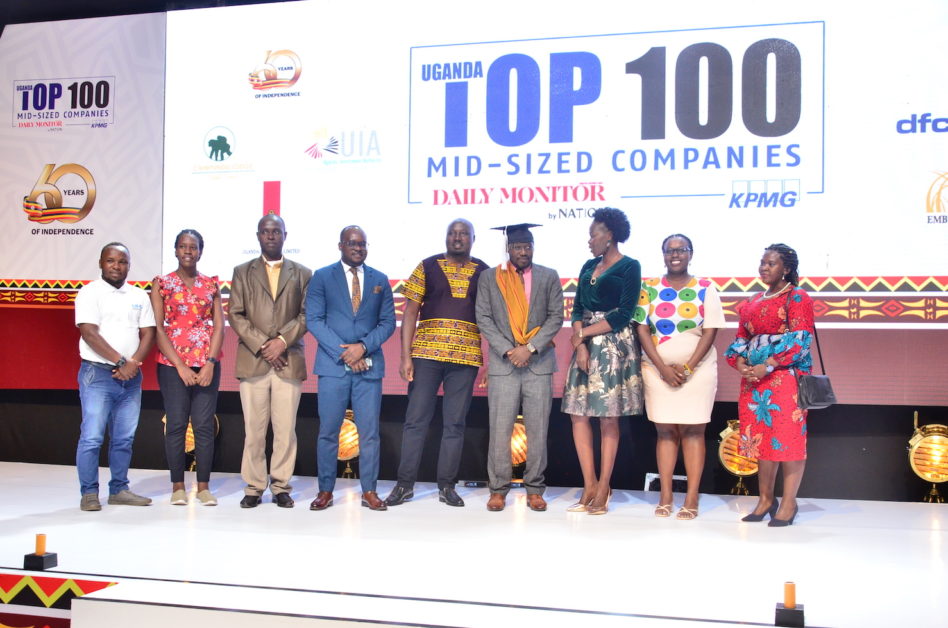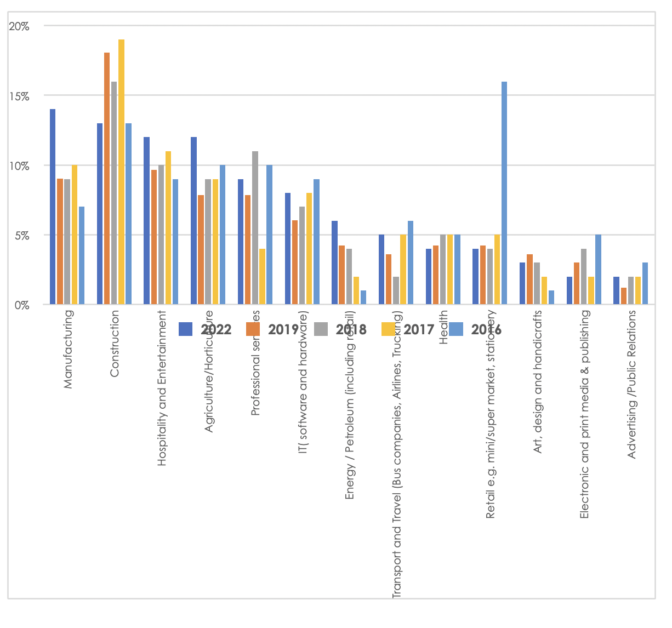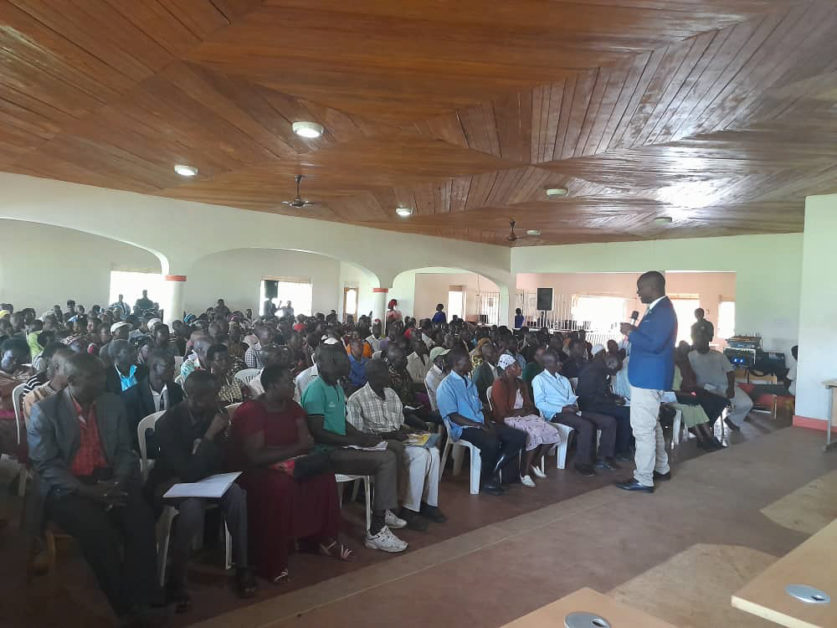Dfcu Limited, the holding company for dfcu Bank, last week released its 2022 results reporting that net profit grew by 217% from UGX9.3 billion in 2021 to UGX29.5 billion in 2022, underpinned by a 6% growth in deposits from UGX2.3 trillion in 2021 to UGX2.4 trillion in 2022. The bank also reported that while lending declined by 9.7% from UGX1.51 trillion to UGX1.36 trillion, the number of borrowing customers increased by 15 per cent. The bank said it is repositioning to “provide its customers with innovative solutions” and to “make a difference in the communities”.
The bank also said it, in 2022, continued making key interventions in the areas of agriculture, women in business and financial inclusion, while attaching greater importance to its Environmental, Social, and Governance programs. It also said it “increased support to small and medium enterprises to enable them to run their businesses sustainably through a variety of financial solutions”. This is all in line with the bank’s refreshed ‘Customer Obsession’, strategy that looks at “transforming lives and businesses through innovative solutions and empowered people’”.
“dfcu Bank is committed to partnerships that promote the transformation and well-being of communities where we operate. During 2022, the bank continued to support the entrepreneurial spirit of Ugandans, enhanced the stability of families and provided a sustainable approach to promoting savings,” explains the bank’s Ag. Chief Executive Officer, Mr. William Sekabembe.
Here below, CEO East Africa Magazine looks at some of the bank’s major interventions in creating lasting interventions and making more possible for its customers
Contributing to agricultural transformation through the Agribusiness Development Centre
dfcu in partnership with Rabo Foundation established Agribusiness Development Centre (ADC) to promote the self-sufficiency of agribusinesses.
Since 2018, the ADC has successfully offered capacity building and business accelerator services to at least 400 enterprises and reached at least 22,000 unique learners, favouring 46% women inclusion in its interventions. It has also facilitated financial linkages worth UGX50 billion for multiple smallholder farmers, at least 40 agribusinesses to social and commercial credit facilities.
Key outcomes from ADC so far
| Total number of trainings | 4,000 |
| Total number of farmers trained | 22,000 |
| Percentage of women | 46% |
| Total number of accounts opened | 2,300 |
| Total number of training | 1,000 |
| Value of loans (linked) | UGX 50 billion |
An excerpt from an impact assessment for the period 2018-2022 indicated that:
- Overall, 43% of ADC-supported enterprises can access and repay financing from financial institutions across the country. The findings demonstrate that the capacity-building interventions by the Agribusiness Development Centre have resulted in financial and market linkages which are relevant and provide added value to the beneficiaries.
- Significant improvements in the economic value of the enterprises are evident, mirrored by an increase in the level of individual savings, utilisation of formal financial institutions for savings and access to financial credit for investment.
In 2022, dfcu through the ADC rolled out the Business Accelerator Program to support business improvements and facilitate the necessary linkages for growth and sustainability. The accelerator targets to enable 350 businesses to become self-sufficient.
Building business capacity through SME TOP 100
The SME Top 100 recognises Uganda’s fastest-growing medium-sized companies and showcases the country’s most successful entrepreneurship stories. dfcu’s involvement in the program creates a platform to provide opportunities to create value and build sustainable businesses. Through this initiative, hundreds of businesses learn from each other; engage policymakers on their contribution to the economy, benchmark against other business operations and much more.

The initiative is boosting the skillset of the selected companies, eventually translating to improved business practices and increased profitability for SMEs.
Participating in this annual competition is critical to business process improvement that ultimately helps entities gain access to new sources of financing, enhance their business management skills and acquire new partners they need to move to the next level.
The 2022 SME TOP 100 activities were anchored on the following:
- An SME survey was conducted to assess the state of SMEs in the post-Covid – 19 era and the interventions needed at different levels.
- Six sector-specific forums were held covering agriculture, hospitality & tourism, and health.
- Two TV dialogues were held which shaped the online conversations on SME-related matters.
- An awards gala which recognised the TOP 100 companies from the SME survey
2022 SME TOP 100 participation by sector

Contributing to financial inclusion and access through financial literacy
dfcu, which is one of the largest banks in the country, supports individuals to access finance; set up and grow their businesses; and gives them the skills to manage their finances through financial education.
Dfcu’s financial inclusion strategy is built on three core strands, namely:
- Deepening access to financial services⏤ helping the unbanked and financially underserved groups to access and use basic financial services
- Offering of tailored products and services
- Programs and initiatives to improve financial knowledge and better financial decisions.
Deepening access to financial services
“We want to give everyone access to financial services, regardless of factors such as income level, gender, educational attainment or geographic location. To achieve its goal of deepening financial access, dfcu deploys a mix of traditional and digital banking channels respectively,” explains Sekabembe.
- Branch network: While the bank pursues innovative digital-banking-led channels, it is also deeply aware of the value of being able to walk into a local branch for face-to-face service, especially when making large deposits and when making major financial decisions. The bank says it is committed to keeping a well-balanced branch network spread across the country.
- Agent banking: Through Agent Banking, dfcu continues to extend financial services to the unbanked and under-banked by creating easy-to-access locations across the country. Services include making cash deposits and withdrawals; balance enquiries; generating mini-statements; paying utility bills; school fees payments and carrying out transfers. In line with the digitisation agenda, the agent banking services are complemented with an instant account opening platform that enables customers to acquire dfcu Bank accounts in less than five minutes.
- 24/7 ATM cash deposits: The bank recently deployed a new ATM fleet that enables customers to deposit cash into their accounts at any of the 66 dfcu ATM points across the network. The deposit-taking functionality has provided added convenience for customers to make cash deposits 24/7.
- Contactless cards: dfcu introduced upgraded contactless Visa cards that allow customers to tap their cards to complete a low-value payment transaction, instead of inserting the card into a point-of-sale machine and entering a PIN. The contactless cards enable a seamless payment process with increased security to allow customers to keep their cards with them rather than handing them to the cashiers or entering a PIN or signing a slip.
- Mobi loans: The digital micro-loan dubbed “dfcu Mobi Loan” allows emerging entrepreneurs and personal account holders to access short-term credit facilities to bridge a temporary financial gap for emergencies that just can’t wait. With the Mobi loan product, customers can access instant loans from as low as UGX 10,000 and up to UGX 2,000,000= using their mobile phones.
- Online Banking: The flagship digital platform Quick Banking helps the bank to overcome some of the barriers to accessing financial products and services. This omnichannel digital platform enables customers to access banking services using the mobile phone (*240#), using the computer (dfcu QuickConnect) or through the mobile App (dfcu Quick App).
- dfcu Investment Club App: “dfcu has a history of promoting a savings and investment culture that dates as far back as 2007 with the introduction of the Savings and Investment Clubs proposition to foster group savings. The Investment Club App is central to the bank’s financial inclusion strategy by encouraging personal and group savings and investments in Uganda. The App simplifies the day-to-day management of group savings by providing a digital real-time view of all financial activities. The App helps with tracking member contributions, managing group lending and collections, effective reporting and general administration anytime, anywhere,” explains Sekabembe.
Tailored products for specific customer groups
dfcu offers specific banking products aimed at bringing underserved customer groups into the banking system. These include affordable savings products such as the Dembe and Group savings accounts are helping to inculcate a savings culture.
The Enterprise Account provides small businesses with convenience and simplicity for their transactions such as the facilitation of making and receiving payments among others. The account comes with no monthly fees providing an affordable option for small enterprises to do their banking.
Promoting financial deepening and education
The dfcu financial inclusion strategy goes beyond providing access to banking services. “We want people to have the skills to manage their finances, so they can make the right choices about what products and services meet their needs. The dfcu Investment Club and SACCO program provides a conducive platform to foster group savings and financial inclusion. In 2022, the program recorded a total banking activity turnover of over UGX 800 billion,” says Sekabembe.

In addition, dfcu partnered with the Government of Uganda and supported the rollout of the Parish Development Model (PDM) model, onboarding over 2,000 PDM SACCOS into the banking system. As part of this partnership, we extended financial literacy to over 1,000 PDM SACCOs with over 300,000 members.
Empowering Women in Business
Sekabembe says, the bank is committed to women-led business ventures that were pioneered with the introduction of the dfcu Women in Business Program which has to date, directly benefited over 80,000 women across the country.
In 2022, the bank’s flagship “Rising Woman” campaign was held under the theme ‘Taking Your Business Ahead’, with an aim of providing female entrepreneurs with the knowledge, skills, and abilities to improve how they operate their businesses; enabling them to create profitable operations. Over 1200 women entrepreneurs directly benefited from the initiative during the year, of which 10 winners were sponsored for a fully paid business tour to Nairobi.
